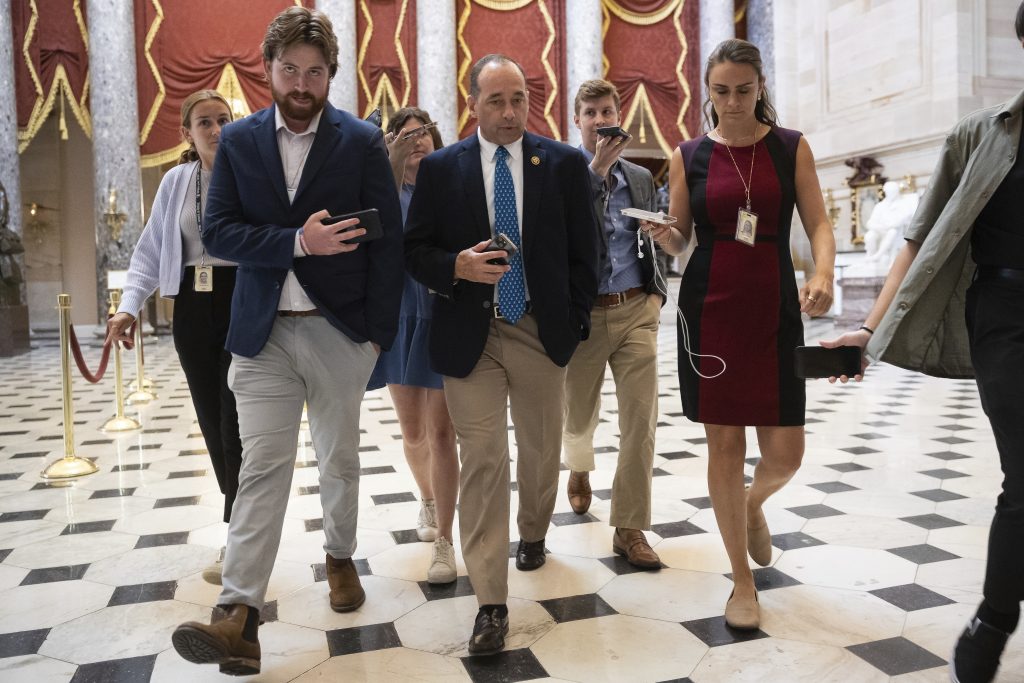The powerful House Freedom Caucus is wrangling with a worsening identity crisis — one that could soon redefine the group’s alignment with former President Donald Trump.
Generally, the divisions lie between the Tea Party-aligned old guard, focused more on conservative principles, and the more populist MAGA-friendly members. It’s a debate that has persisted in the notoriously private group for a while, but its fights are increasingly spilling into the open.
Members have had multiple public rifts over the past year — including ugly personal feuds stemming from the likely primary defeat of Freedom Caucus Chair Bob Good (R-Va.). There’s also been near-constant tension over the past year due to votes to boot members, the ouster of former Speaker Kevin McCarthy, spending disputes and hardball floor tactics.
Six Freedom Caucus members expressed to POLITICO that the group needs new leadership as soon as possible in order to move forward, particularly as they prepare for spending fights and a potential Trump takeover next year. But that discussion has also divided the caucus, as members lobby for leadership that suits their distinct visions of the group’s future.
“There’ll be a number of people that would consider it,” Rep. Ralph Norman (R-S.C.) said about the race to succeed Good. And he acknowledged friction within the group: “Have there been disagreements? Yes. Will there be disagreements in the future? Yes, but I don’t look at that as a bad thing.”
Good is facing a recount in his primary on Thursday, a race he officially lost by about 400 votes after Trump endorsed his opponent. If the recount upholds his defeat, as expected, Good told POLITICO that he would resign immediately as chair. It would mark both the first time the group has faced a vacancy atop its ranks during a presidential election year and the first time its chair has been ousted in a primary.
The group is likely to use the six-week summer break to strategize, according to three members, and is not expected to make a formal decision about new leadership until the House returns in early September. That would mark the first time they’re able to meet in person as a group since Thursday’s recount.
Some members have discussed allowing a former chair, like Reps. Scott Perry (R-Pa.) or Andy Biggs (R-Ariz.), to temporarily fill the seat until next year. While installing a chair emeritus would give members more time to decide on a long-term replacement, some argue this process is not within the Freedom Caucus’ bylaws — though they are in largely uncharted territory.
The other option is having the Freedom Caucus board move to recommend a new chair as soon as September, likely installing that person for the rest of Good’s term, which runs through the end of next year. But the split over the potential candidates runs deep, particularly with a possible second Trump term looming in January.
Among the names most frequently mentioned: Reps. Andy Ogles (R-Tenn.), Chip Roy (R-Texas) or Andy Harris (R-Md.).
Some members want to align the group closer to Trump, particularly after some felt like they were in an awkward spot when the ex-president endorsed Good’s primary opponent, John McGuire. Those members hope that a second Trump administration could help focus the disparate factions within the Freedom Caucus — which has managed to be a headache for Republican leadership this term not because of their unity, but due to the GOP’s incredibly thin majority.
“I think under a Trump administration, especially with so many of us being close to Trump, that gives us a great opportunity to further shape policy,” Ogles, who has expressed interest in serving as the next chair, said in a brief interview.
Ogles, who is on the group’s board, told POLITICO that he privately reached out to every member of the caucus amid the dustup between Good and Rep. Warren Davidson (R-Ohio), which ultimately led to the latter’s ouster. Ogles said that, in his capacity as a board member he “checked with them, made sure they are OK, what concerns do they have, as we continue to stay together as a team and build the team going forward.”
That sparked chatter that Ogles is eyeing the top HFC spot, but Ogles is also facing his own difficult primary challenge. And there’s skepticism among a swath of Freedom Caucus members about giving their top spot to someone who is currently serving their first term.
Roy’s name also frequently comes up as someone who could serve in the top spot, but he could stir up concerns with members who would rather bear hug Trump. Roy has stoked the former president’s ire multiple times — voting to certify the 2020 election and, like Good, initially endorsing Florida Gov. Ron DeSantis for president.
Two Freedom Caucus members, granted anonymity to speak candidly, said that it was fair to raise Roy’s support for DeSantis as they weigh the Texas Republican as a potential next chair. Others who back Roy have also questioned if he actually wants the job, noting that he is a good fit in his current role as policy director.
“That’s not something I’m going to talk about. What we’re going to figure out is what’s best going forward. We’re all committed to the mission. Every organization — they go through some differences of opinion,” Roy said, when asked about running for chair.
Harris is also viewed as a potential Good successor. The Maryland Republican, who was first elected in 2010, aligns more closely with the group’s other fiscal hawks in the Tea Party-aligned wing, and Freedom Caucus members say he expressed interest in the top spot in 2023 before Good was ultimately elected.
The group has increasingly split over what its fiscal strategy should be, with some arguing that they overplayed their hand in this Congress’ government funding fights. And next year, if Trump takes the White House, leadership could play a key role in how much the group embraces Trump policies — particularly if he pushes efforts that would raise spending again.
But it’s the group’s fraught relationship with Trump that has gotten the spotlight under Good’s stewardship. When members of the group took a trip to Trump’s trial in New York earlier this year, normally chatty Freedom Caucus Republicans refused to talk about it. They were concerned they would face backlash from Trump and his supporters if the House voting schedule forced them to back out.
Critically, concerns about the group’s future also extend to their own elections. Republicans have raised private concerns that the group’s campaign arm has lagged in fundraising, meaning it has less bandwidth to protect vulnerable incumbents.
Then there are the internal feuds about membership. In addition to Davidson, at least three other members have been ousted in the past two years: Retired Rep. Ken Buck (R-Colo.), Rep. Randy Weber (R-Texas) and Rep. Marjorie Taylor Greene (R-Ga.). Greene’s ouster was during Perry’s tenure.
Rep. Jim Jordan (R-Ohio), a co-founder of the group, has argued that he wants Davidson, who is a close ally, back in the Freedom Caucus. The 16-13 vote to boot him in July sparked bad blood between multiple members, as some claimed that Good’s allies had forced a vote when some of Davidson’s supporters were missing and had bent the group’s rules.
“My concern is that I don’t think we should be kicking people out. I’ve been clear about that,” Jordan said in a brief interview.
Davidson didn’t directly wave off rejoining the Freedom Caucus but quipped: “It’s tough to be in a group where half the people don’t really want you.”




